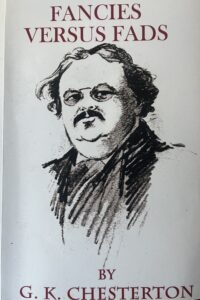 Fancies Versus Fads is a 1923 collection of 30 previously published essays by G.K. Chesterton, covering a wide range of topics including modernity, feminism, divorce, poetry, drama, literature, education, progressivism, and prohibition. Here Chesterton is at his wittiest, most penetrating, and most passionate.
Fancies Versus Fads is a 1923 collection of 30 previously published essays by G.K. Chesterton, covering a wide range of topics including modernity, feminism, divorce, poetry, drama, literature, education, progressivism, and prohibition. Here Chesterton is at his wittiest, most penetrating, and most passionate.
Some excerpts:
From The Romance of Rhyme, a takedown of free verse.
“What I will never admit is that anyone who is too big for the nursery is big enough for the Kingdom of God …”
“But vers libre, or nine-tenths of it, is not a new metre any more than sleeping in a ditch is a new school of architecture.”
“The old artist remained proud in spite of his unpopularity; the new artist is proud because of his unpopularity; perhaps it is his chief ground for pride.”
From Hamlet and the Psycho-Analyst
“But no doubt if Freud had enjoyed the opportunity of explaining his ideas in an ancient ale-house, they would have met with more spontaneous applause.”
“But this is but a preliminary point, and I shall touch the more serious problem in a few minutes, if the fashion has not changed before then.”
“Where [Hamlet] differed from the modern morality’s that he believed in the possibility of disliking it and yet doing it.”
“The critic instinctively avoids the admission that Hamlet’s was a struggle between duty and inclination; and tries to substitute a struggle between consciousness and subconsciousness. He gives Hamlet a complex to avoid giving him a conscience.”
“The sort of duty that Hamlet shirked is exactly the sort of duty that we are all shirking; that of dethroning injustice and vindicating truth. Many are now in a mood to deny that it is a duty because it is a danger.”
From The Meaning of Mock Turkey
“… some might think the very mention of a king, a piece of reactionary royalism, inconsistent with that democratic self-determination we all enjoy under some five Controllers and a committee of the Cabinet.”
From The Fear of the Film
“In short, so long as we combine ceaseless and often reckless scientific speculation with rapid and often random social reform, the result must inevitably be not anarchy but ever-increasing tyranny.”
From Prohibition and the Press
“It seems impossible to exaggerate the evil that can be done by a corrupt and unscrupulous press.”
From The Mercy of Mr. Arnold Bennett
“In truth there are only two kinds of people; those who accept dogmas and know it, and those who accept dogmas and don’t know it.”
From False Theory and the Theatre
“The perfect artist would be he who could put on a crown of gilt wire or tinsel and make us feel he was a king.”
From The Secret Society of Mankind
“… indeed the author did himself some injustice in insisting on his own modernity; for he was not so very modern after all, but really quite lucid and coherent.”
From Street Cries and Stretching the Law
“I should be prepared to maintain, as a matter of general morality, that it is intrinsically indefensible to punish human beings for asking for human assistance. I should say that it is intrinsically insane to urge people to give charity and forbid people to accept charity. Nobody is penalized for crying for help when he is drowning; why should he be penalized for crying for help when he is starving?”
From Turning Inside Out
“The human house is a paradox, for it is larger inside than out.”
“… the passage from private life to public life, while it may be right or wrong, or necessary or unnecessary, or desirable or undesirable, is always of necessity a passage from a greater work to a smaller one, and from a harder work to an easier one. … For anyone who makes himself responsible for one small baby, as a whole, will soon find that he is wrestling with gigantic angels and demons.”
From A Note on Old Nonsense
“It is human to err; and the only final and deadly error, among all errors, is denying that we have ever erred.”
